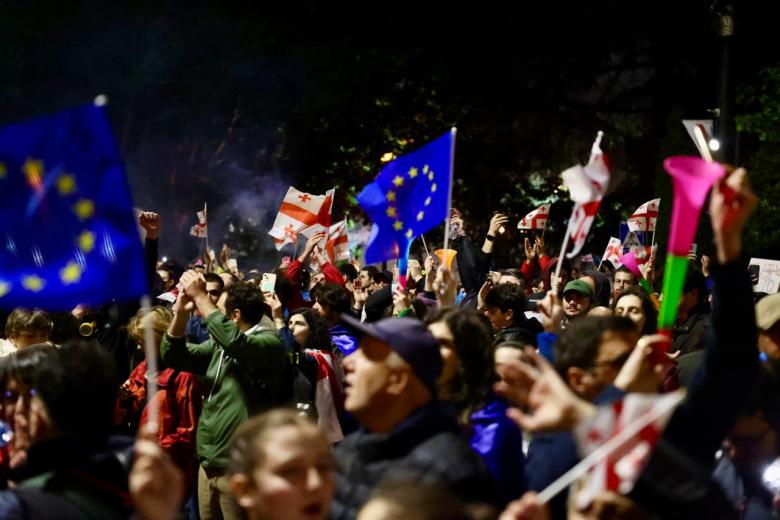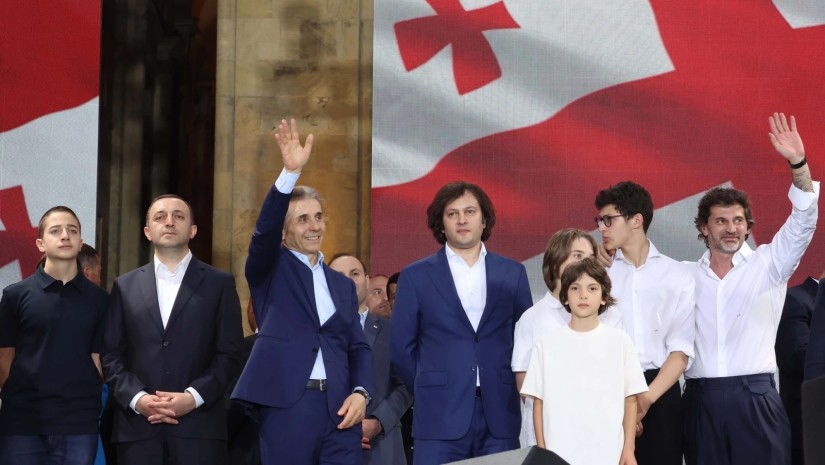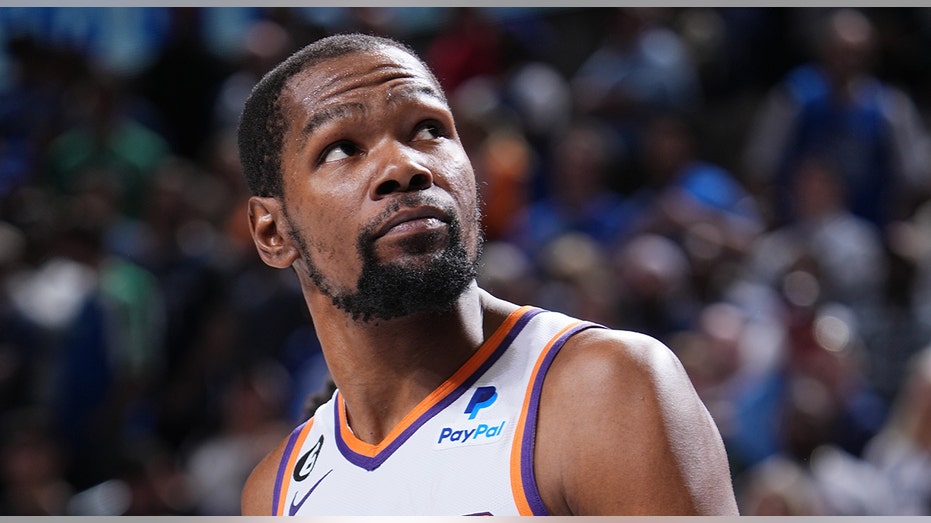The global implications of Georgia’s political crisis
As Georgia's government cracks down on dissent and aligns itself with the Kremlin, the country's role as a crucial link in the Middle Corridor connecting Europe to Asia is under threat, potentially disrupting global trade flows and energy supply chains.


As the West’s political leaders become increasingly preoccupied with the ongoing wars in Ukraine and Gaza, they risk losing their geopolitical influence in a small but strategically significant Black Sea country: Georgia.
On 29 April, in one of his rare public appearances, Bidzina Ivanishvili—the founder and de facto leader of the ruling Georgian Dream party and a reclusive billionaire—accused the United States and the European Union of being Western “global war parties” and meddling in Georgia’s internal affairs.

Taking a page from Russian President Vladimir Putin’s playbook, Ivanishvili vowed to reintroduce a law on “foreign agents,” which would label organizations receiving more than 20% of their funding from abroad as being under foreign influence. The Kremlin-style law would allow the government to eliminate NGOs working for democracy and the rule of law, suppress independent media, and eradicate the opposition. Given this, the conclusion of Ivanishvili’s speech, in which he promised EU accession, sounded like an Orwellian joke.
The speech, which was quickly followed by the law’s passage on May 14, marked Georgia’s turn toward an autocratic regime similar to that of Belarusian President Aleksandr Lukashenko. Tens of thousands of protesters, led by Georgia’s young people, have taken to the streets to express their dissent, and their numbers continue to grow despite the government’s violent attacks on opposition politicians and demonstrators.
Georgia has been here before. The government first introduced a law on foreign agents in March 2023, only to withdraw it following mass protests. Since then, Georgia was granted EU candidate status, which reassured many Georgians of their country’s European future. So why, given his seemingly pro-Western stance, did Ivanishvili make a U-turn now, ahead of parliamentary elections and when 90% of the population support EU accession?
The answer lies in Russia, where Ivanishvili amassed his fortune.
The trajectory of the deep-sea port project in the Georgian town of Anaklia is illustrative. A joint venture between Georgia’s TBC Holding and US-based Conti International was awarded the contract to build and operate the port in 2016. But the Georgian government terminated their contract in 2020, presumably under pressure from Russia, and is now considering bids from Chinese investors.
Still, preventing the West from making inroads into Georgia requires more than geopolitical maneuvering. The Georgian government must also turn to domestic repression to halt progress on the country’s EU and NATO bids.
It no longer matters whether Ivanishvili, who has been steering the country since 2012 (albeit mostly from the wings), has always been Russia’s Trojan horse or only recently decided that democracy does not serve his personal and political interests. The outcome remains the same: Putin has found a strong ally in Ivanishvili, who seems just as determined to distance Georgia from the West. This is a particularly dangerous objective as the fight for Ukraine’s future enters yet another decisive phase.
Russia is playing for high stakes. Burying Georgia’s European future would strengthen the Kremlin’s influence in the Caspian Sea region and Central Asia and bring Putin closer to his objective of rebuilding the Russian Empire. When the EU granted candidate status to Georgia in December 2023, it sent a signal to its neighbors, especially Armenia and Azerbaijan, that the EU is committed to the long-term integration of the region. This has led Armenia – Russia’s strategic foothold in the Caucasus – to seek closer ties with the EU.
“Story of a dying empire”: Georgia’s “foreign agent” law protests echo Ukraine’s Euromaidan
The Central Asian countries, rich in energy and mineral resources, have also expressed a growing interest in cooperating with the EU. Putin understands that crushing Georgia’s democratic and Western aspirations will likely put an end to these unwelcome developments.
As Georgians resist the re-Russification of their country, the West must also act. The US is moving in the right direction: two bills that would support Georgia’s democracy and sanction politicians and officials attempting to destroy it have been introduced in the House of Representatives and the Senate. Moreover, Secretary of State Antony Blinken has announced that visa restrictions will apply to anyone who undermines democratic processes or institutions in Georgia.
But to ensure that the proposed travel bans and financial sanctions are not empty threats, the US and the EU need to impose restrictions on Ivanishvili and the main players in his circle, including the henchmen who are intimidating demonstrators. This would offer the clearest possible sign of Western support for Georgia’s democracy.
Meanwhile, Georgia requires an unprecedented level of assistance, including an army of election observers, in the run-up to parliamentary polls in October 2024. The Georgian opposition parties have begun to form a pro-European front to challenge the ruling party, but they will need strong international support.
The upcoming elections are a referendum on Georgia’s European future, and if they are unfair, the West will likely lose its influence in the region. A coordinated US-EU policy is needed to ensure that Georgia’s democracy survives this crisis. A victory for Putin’s allies would have devastating consequences for both Georgians and the West.
Copyright: Project Syndicate. This article was published by Project Syndicate on 28 May 2024 and has been republished by Euromaidan Press with permission.
Editor’s note. The opinions expressed in our Opinion section belong to their authors. Euromaidan Press’ editorial team may or may not share them.
Submit an opinion to Euromaidan Press
Related:
- Georgia’s Foreign Agents law: Russia’s new frontline in its war against freedom in the world
- “Story of a dying empire”: Georgia’s “foreign agent” law protests echo Ukraine’s Euromaidan
- From Rose Revolution to “Russian Dream”: Georgia at breaking point with pivotal pro-EU protests



